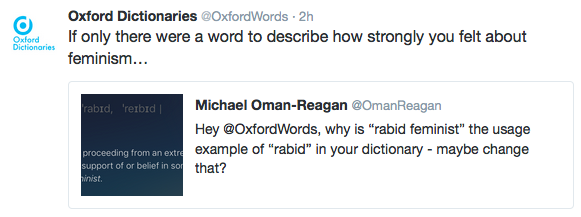The work I have been doing around language in a digital age has mostly involved the algorithmic reproduction of language through search engines such as Google.
However, I have just come across an interesting (and very heated) debate taking place on Twitter involving Oxford Dictionaries Online, the digital version of the Oxford Dictionary of English which (amongst other things) supplies Apple products with their built-in British-English dictionary.
The argument appears to have started when one Twitter user noticed that the Oxford Dictionary’s usage example of the word ‘rabid’ happens to be ‘a rabid feminist’, and suggested the dictionary might like to change what could be perceived as a sexist example.

But instead of acknowledging the problem, Oxford Dictionary’s official Twitter account @OxfordWords instead defended its example by claiming that ‘rabid isn’t always negative’.
Now I’m fairly certain I have never come across the word rabid used in a positive way. The word has the same origin as the disease Rabies:
early 17th cent (in the sense ‘furious, madly violent’): from Latin rabidus, from rabere ‘to rave’)
But ignoring this questionable defence for a moment, what really interests me in terms of my research is that the Oxford Dictionary further defended their example by stating that ‘our example sentences come from real-world use and aren’t definitions’. Delving further into how examples might be generated, the Oxford Dictionary website explains how the phrases are drawn from ‘a vast bank of more than 1.9 million example sentences (around 38 million words) of real English, extracted from the world’s newspapers and magazines, academic journals, fiction, and blogs’.
Just like the work I have been doing around the apparently sexist or racist stereotypical and offensive phrases which are often generated through Google Search and Autocomplete, it seems that the Oxford Dictionary’s examples are just a reflection of the (not always representative) linguistic data that exists online. The phrases generated as likely usage examples will therefore mirror the most likely pairings or orderings of already existing words based on the semantically irrelevant factors of frequency and proximity. It would therefore seem (rightly or wrongly) that the word ‘feminist’ is paired more often with the word ‘rabid’ than any other word in the corpus of available linguistic data, including – we must assume – the word ‘dog’, which is an interesting linguistic development in itself.
Where the Oxford Dictionary differs from Google, however, is that it seems to recognise that this ‘big data’ method of example generation might throw up some controversial results. There is a fairly comprehensive caveat on the website which illustrates this:
Please note: All the examples sentences throughout the site are real examples of usage. They are taken from a huge variety of different sources, from all parts of the world where English is used, and they reflect a wide spectrum of views and levels of language. Opinions and views expressed in the usage examples are the views of the individuals concerned and are not endorsed by Oxford University Press.
But while it might recognise the potential limitations of its methods, the Oxford Dictionary seems decidedly unwilling to mitigate the damage caused by their effects, and decided instead to exacerbate (and seemingly personalise) the problem by tweeting ‘If only there were a word to describe how strongly you felt about feminism’.

As I write there are more and more examples being cited of Oxford Dictionary’s seemingly ‘sexist’ usage examples: a Doctor is always a ‘he’, the housework is done by a woman, and the ‘female psyche’ stands out as the most problematic.

Again, it is much the same as when somebody noticed that Google’s response to a search for ‘she invented’ was to ask ‘did you mean he invented’.

Perhaps what is most significant to my research, and in comparison to Google, is the reach and therefore the discursive influence that the Oxford Dictionary’s usage examples might have. As I mentioned earlier, the Oxford Dictionary supplies Apple with its British-English database of definitions and examples, which means that the compounding of linguistic stereotypes has potentially far reaching consequences. To paraphrase another Twitter user, with examples such as ‘rabid feminist’, the Oxford Dictionary is in effect ‘beaming a sexist lexicography straight to students’ iPads’.

My thesis will explore why things like this matter, and the influence large corporations have on language which is processed, organised and reproduced through digital spaces. It’s easy to blame an algorithm, technology or an empirical method, but the proprietary method in which online linguistic data is harvested, utilised and monetised should come with a certain degree of responsibility. After all, as the @OxfordWords Twitter header reminds us, Language Matters.

